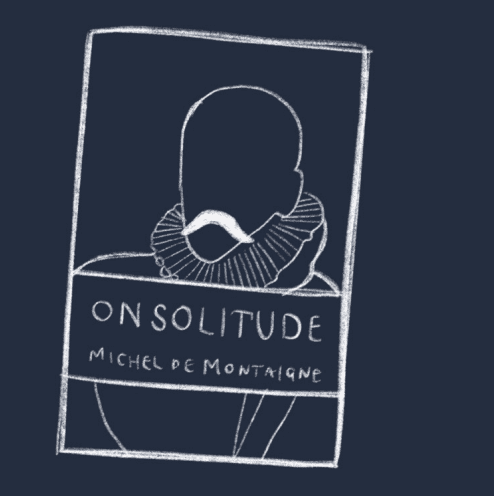CONTENT WARNING: Mental Health
“If you do not first lighten yourself and your soul of the weight of your burdens, mov- ing about will only increase their pressure on you. A ship’s cargo is less troublesome when lashed in place.” – Montaigne, On Solitude.
In times of crisis, I always find I return to books that comforted me as I was growing up. Last week, in a state of absolute boredom, I pored over my old and dusty shelves in search of anything that might provide some comfort or reprise from the chaos that has been caused by the recent pandemic. A novel – an Austen, or Lewis, or Tolkien.
But what caught my eye was the complete opposite: a book about philosophy. A book on isolation. A book that, instead of providing an escape, forced me to confront my situation very directly. This was Montaigne’s On Solitude, which I have quoted briefly above. It’s not particularly long – the section on being alone spans 20 pages – but it is nonetheless relevant and potent.
In a sentence, Montaigne quietly suggests that the calamity and chaos of the outside world isn’t just outside of us, it is something that is brought inside of us and manifests in our anxious mindsets and behaviours. This is not to downplay the severity of the situation – I am one of many who has been put in a difficult situation with rent, income and the like. Rather, Montaigne is asking us to focus on how the world’s affairs are affect- ing us. How is COVID-19 exacerbating our fears – and sometimes our biases – to bring about negativity? We’ve seen horrendous instances of racism, as well as excessive stockpiling of essentials, which has taken away resources from those vulnerable members of our community that can only afford to buy week by week.
COVID-19 did not cause this. Our thoughts and beliefs about COVID-19 did – and that is precisely what Montaigne invites us to challenge. When we are alone with our- selves, we are uniquely positioned to interrogate and consider our own thoughts. It is an opportunity for us to remove ourselves from the bustle of everyday life and reflect deeply on how we are internalising and projecting our feelings into the world. In his words, “It is our own self we have to isolate and take back into possession.”
Over the past few weeks, I have tried to take this advice on board. Rather than ruminating in my sadness from having my life disrupted, I have realised that those feelings of hopelessness and despondency are caused by me. They have resulted due to my choice to view my predicament as a disaster rather than an opportunity. Now, I won’t pretend that this realisation made everything better. Far from it. But what I did find is that viewing isolation as an opportunity gave way to a more productive mind-set.
I’ve decided to see isolation as a gift, a rare chance to make good on all the promises that I made to myself. One of these was to spend my time with my cousin. He has Asperger’s syndrome and often has trouble socialising with people, but one thing he adores is the gym. He loves talking about CrossFit, WWE Wrestling and MMA. I’ve told myself for the longest time that I would work on a fitness project with him, but it never eventuated. Until now. Together, we’ve built a home gym that we use most days. He teaches me bits and pieces about fighting (he’s a brown belt) that I can use if I’m ever in a situation where I need to de- fend myself (watch out Mooseheads). In re- turn, I’ve taught him how to correct his form for certain exercises in the gym. In its own way, it’s been a blessing and has brought our family closer.
As time goes on, there will certainly be ups and downs with isolation and COVID-19. I don’t believe I’ll navigate these perfectly. But what I do believe is that a focus on what I can control rather than what I can’t control will situate me best for whatever happens.
“So we must bring her back, haul her back, into our self. That is true solitude. It can be enjoyed in towns and in kings’ courts, but more conveniently, apart.”
We acknowledge the Ngunnawal and Ngambri people, who are the Traditional Custodians of the land on which Woroni, Woroni Radio and Woroni TV are created, edited, published, printed and distributed. We pay our respects to Elders past and present. We acknowledge that the name Woroni was taken from the Wadi Wadi Nation without permission, and we are striving to do better for future reconciliation.
